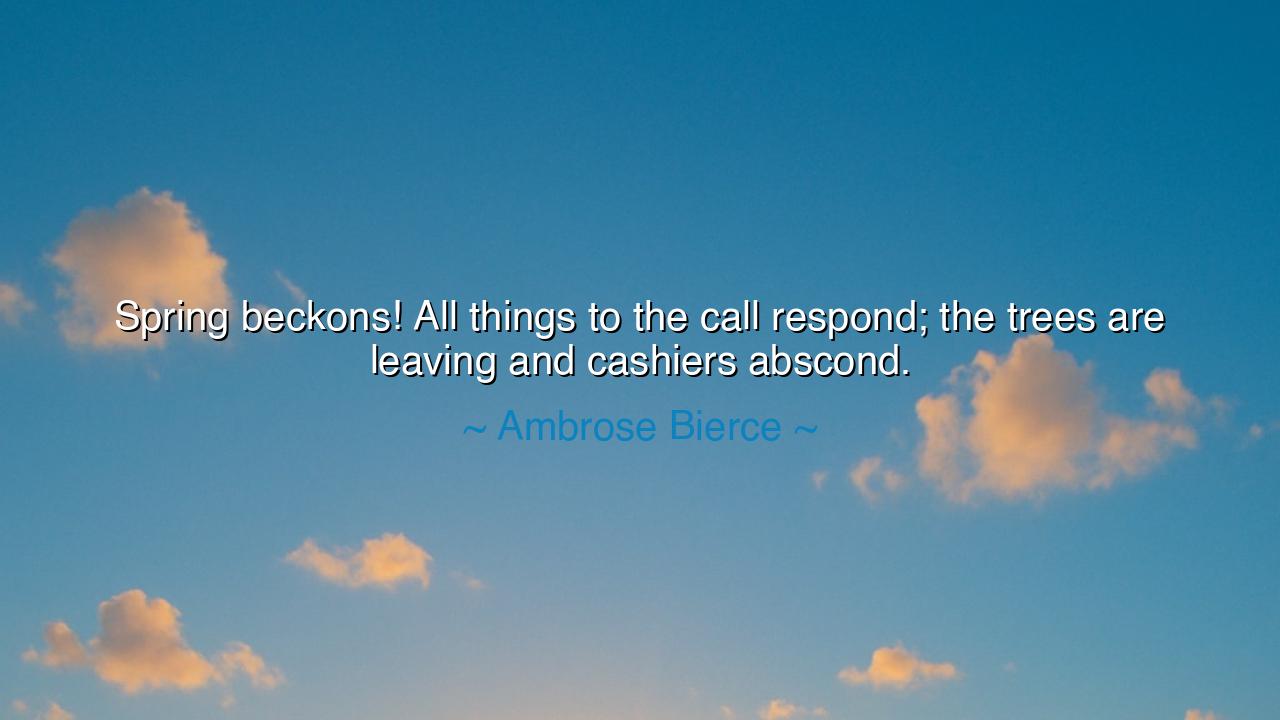
Spring beckons! All things to the call respond; the trees are
Spring beckons! All things to the call respond; the trees are leaving and cashiers abscond.






Hear the sharp and playful words of Ambrose Bierce, who wrote: “Spring beckons! All things to the call respond; the trees are leaving and the cashiers abscond.” Though humorous in tone, this line conceals wisdom wrapped in wit, as was Bierce’s way. For spring, that season of renewal, does not merely stir the blossoms and awaken the forests—it also awakens the restless heart of man. It calls creatures to movement, to change, to abandon the old and seek something new. The trees cast forth their leaves, dressing themselves in living green; the cashiers, symbols of human toil and coin, slip away from their duties, lured perhaps by sunlight, leisure, or the temptation of escape. Thus Bierce weds the natural and the human in one playful yet poignant picture of how all living things answer to spring’s call.
The trees obey gladly, clothing themselves in glory. Their surrender to the season is harmonious, life-giving, inevitable. But man—Bierce’s cashier—often responds differently. Instead of blooming into greater vitality, he absconds, abandoning duty, shirking responsibility. This is satire, yet it is also a warning: that the call of spring, which ought to renew us, can also tempt us into neglect if our hearts are not rooted. The world awakens, but how shall we awaken? With discipline and beauty, or with flight and folly?
In ancient times, men felt this truth deeply. The Romans celebrated the Floralia, festivals of flowers and renewal, when people cast off restraint to revel in the joy of the season. Crops sprouted, lambs were born, and humanity joined nature in exultation. Yet even then, moralists warned of excess, of men absconding from their responsibilities in pursuit of pleasure. Bierce, in his dry humor, echoes this ancient wisdom: the same season that renews the trees can also draw the weak-hearted away from duty.
History gives us examples of both. Think of the soldiers at Valley Forge. The cruel winter nearly destroyed them, yet when spring came, it brought not only warmth but renewal of spirit. Under Washington’s guidance, the army was trained, disciplined, and transformed into a force that would one day prevail. These men answered spring’s call not with abandonment, but with endurance and rebirth. Contrast this with times of corruption in empires, when men entrusted with wealth—like Bierce’s cashiers—fled with riches, abandoning their posts, tempted by ease rather than anchored by duty.
The meaning is thus: spring is a time of power, a summons that none can ignore. It awakens both beauty and temptation, both renewal and restlessness. The trees cannot choose; they must leaf and flourish. But man can choose—either to rise with the season, strengthening his work and refreshing his soul, or to flee his obligations, absconding from the tasks that life has entrusted to him. Bierce laughs, but his laughter has teeth.
The lesson is clear: answer the call of renewal, but do not mistake it for escape. Let the spring that stirs the earth also stir your heart to greater effort, greater joy, greater fidelity. Do not be like the cashier who runs away from his trust; be like the tree that, when called by the season, adorns itself with new life, offering shade, beauty, and fruit. In this way, the joy of spring becomes not an excuse for neglect, but a force of transformation.
What, then, are the practical actions? Welcome the season of change by refreshing your spirit. Begin anew the labors you may have let grow weary in the winter of your life. Cleanse your mind as the rains cleanse the earth. Take up neglected tasks with vigor. Create, renew, serve, and grow. Let the playful satire of Bierce be your reminder: all things respond to the call of spring—see that you respond not by absconding, but by flourishing.
So remember the words of Bierce: “Spring beckons! All things to the call respond; the trees are leaving and the cashiers abscond.” In his jest lies truth eternal—that the season summons both nature and man. See to it that your response is noble, that you leaf like the tree, not flee like the careless, and your spring shall bear fruit for all to see.






AAdministratorAdministrator
Welcome, honored guests. Please leave a comment, we will respond soon